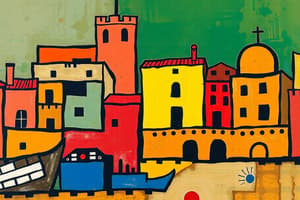Podcast
Questions and Answers
What was a significant consequence of the Black Death in Medieval Europe?
What was a significant consequence of the Black Death in Medieval Europe?
What was a characteristic of Gothic Architecture in Medieval Europe?
What was a characteristic of Gothic Architecture in Medieval Europe?
What was the primary reason for the Crusades launched by European Christians?
What was the primary reason for the Crusades launched by European Christians?
What was a significant event that marked the end of the Western Roman Empire?
What was a significant event that marked the end of the Western Roman Empire?
Signup and view all the answers
What was a significant consequence of the rise of City-States in Late Medieval Europe?
What was a significant consequence of the rise of City-States in Late Medieval Europe?
Signup and view all the answers
What was a characteristic of Feudalism in Medieval Europe?
What was a characteristic of Feudalism in Medieval Europe?
Signup and view all the answers
What was the primary reason for the establishment of Universities in Medieval Europe?
What was the primary reason for the establishment of Universities in Medieval Europe?
Signup and view all the answers
What was a significant event that marked the beginning of the Late Middle Ages?
What was a significant event that marked the beginning of the Late Middle Ages?
Signup and view all the answers
Study Notes
Medieval Europe (500-1500 CE)
Overview
- Period of European history between the fall of the Roman Empire and the Renaissance
- Characterized by feudalism, knights, castles, and the rise of Christianity
Early Middle Ages (500-1000 CE)
- Fall of the Roman Empire: Decline and fall of the Western Roman Empire (476 CE)
- Barbarian Invasions: Germanic tribes (e.g. Visigoths, Vandals) invaded and established kingdoms in Europe
- Rise of Christianity: Christianity became the dominant religion in Europe, with the Catholic Church playing a central role
- Feudalism: System of governance and social hierarchy based on land ownership and loyalty
High Middle Ages (1000-1300 CE)
- Crusades: Series of military campaigns launched by European Christians to reclaim the Holy Land from Muslim rule (1095-1291)
- Feudal Monarchies: Powerful kingdoms emerged, such as England, France, and the Holy Roman Empire
- Gothic Architecture: Development of distinctive architectural style characterized by pointed arches, ribbed vaults, and flying buttresses
- Universities: Establishment of institutions of higher learning, such as the University of Paris and the University of Bologna
Late Middle Ages (1300-1500 CE)
- Black Death: Pandemic that devastated Europe, leading to significant social, economic, and cultural changes (1346-1353)
- Hundred Years' War: Series of conflicts between England and France that lasted for 116 years (1337-1453)
- Rise of City-States: Independent city-states, such as Venice and Florence, emerged as centers of trade and culture
- Decline of Feudalism: Feudal system began to decline, paving the way for the rise of nation-states and the Renaissance
Medieval Europe (500-1500 CE)
Overview
- Lasted from the fall of the Roman Empire to the Renaissance
- Characterized by feudalism, knights, castles, and the rise of Christianity
Early Middle Ages (500-1000 CE)
- Roman Empire fell in 476 CE, marking the end of the Western Roman Empire
- Germanic tribes, such as the Visigoths and Vandals, invaded and established kingdoms in Europe
- Christianity became the dominant religion in Europe, with the Catholic Church playing a central role
- Feudalism emerged as a system of governance and social hierarchy based on land ownership and loyalty
High Middle Ages (1000-1300 CE)
- Crusades were a series of military campaigns launched by European Christians to reclaim the Holy Land from Muslim rule between 1095 and 1291
- Powerful kingdoms emerged, including England, France, and the Holy Roman Empire
- Gothic Architecture developed, characterized by pointed arches, ribbed vaults, and flying buttresses
- The University of Paris and the University of Bologna were established as institutions of higher learning
Late Middle Ages (1300-1500 CE)
- The Black Death pandemic devastated Europe between 1346 and 1353, leading to significant social, economic, and cultural changes
- The Hundred Years' War was a series of conflicts between England and France that lasted for 116 years from 1337 to 1453
- Independent city-states, such as Venice and Florence, emerged as centers of trade and culture
- The feudal system began to decline, paving the way for the rise of nation-states and the Renaissance
Studying That Suits You
Use AI to generate personalized quizzes and flashcards to suit your learning preferences.
Description
Test your knowledge of Medieval Europe, a period of European history marked by feudalism, knights, castles, and the rise of Christianity, from the fall of the Roman Empire to the Renaissance.



